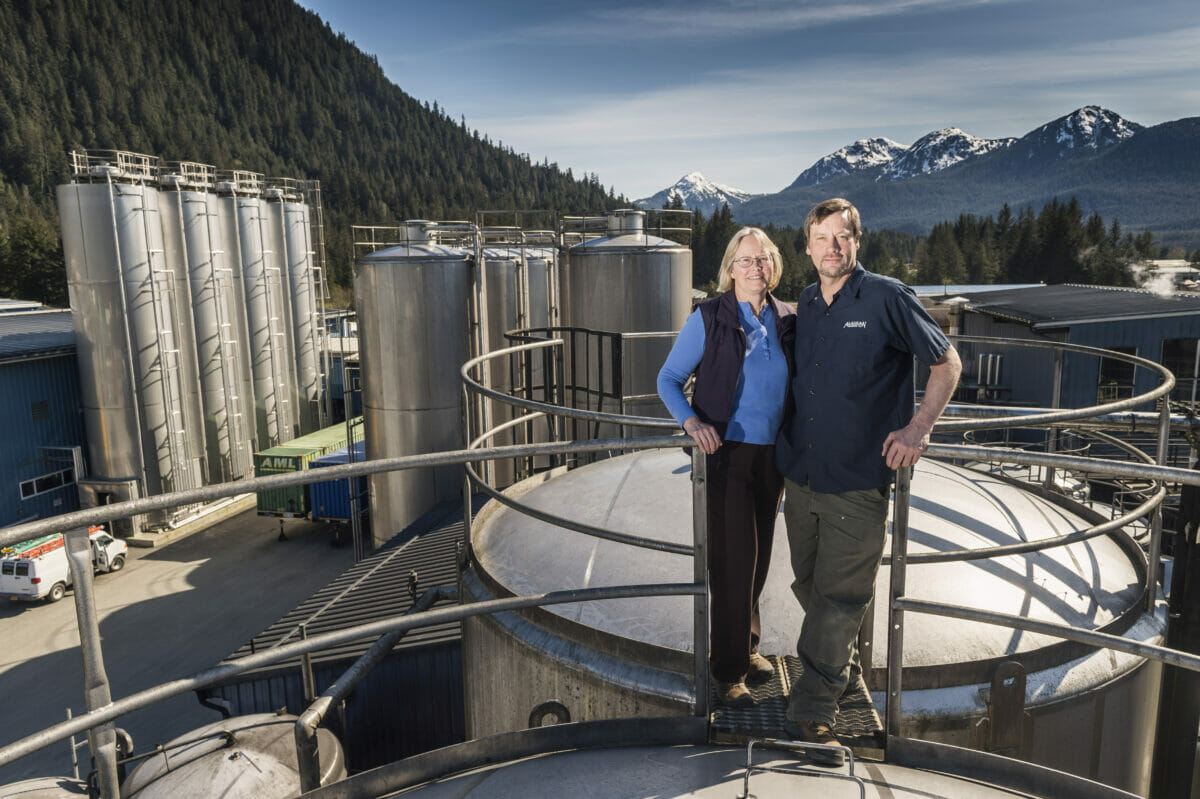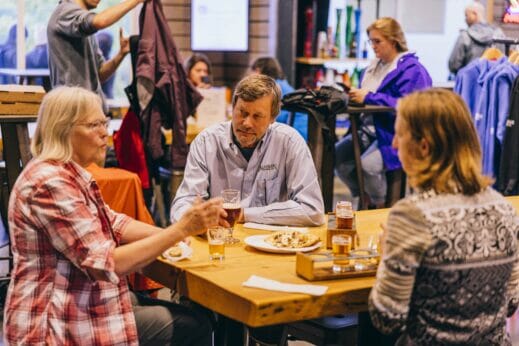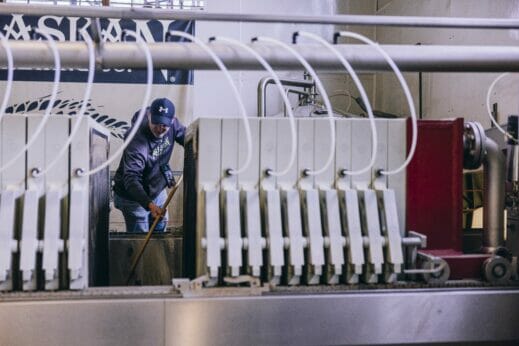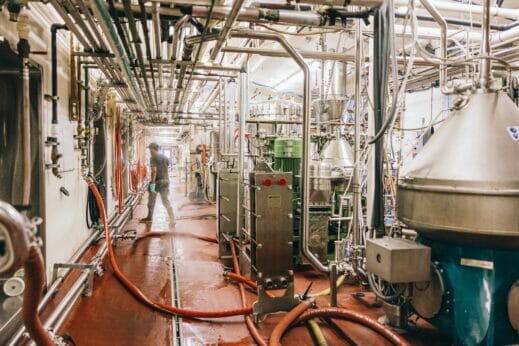Marcy and Geoff Larson have spent 37 years developing groundbreaking technology to reduce their carbon footprint while brewing award-winning, eco-friendly beer in Juneau, Alaska.

Marcy and Geoff Larson firmly believe that necessity is the mother of invention. “We live outside the box, so we think outside the box,” says Geoff of the can-do attitude that propelled the couple to open the first brewery in the Alaskan capital of Juneau since Prohibition.
Since opening up shop in 1986, the Larsons have established Alaskan Brewing as a respected leader of the American craft beer industry, notching up a record 49 wins at the Great American Beer Festival, including 16 gold medals, and distributing to 25 states. But the Larsons don’t just make great beer—they make some of the most environmentally friendly beer on the planet. By using cleverly designed closed-loop systems to conserve and recycle resources and minimize their carbon footprint, the Larsons have effectively eliminated the majority of the waste that brewing creates, repurposing it back into the beer-making process. They call it “beer-powered-beer.”
Accountant Marcy and chemical engineer Geoff moved to Alaska together in 1982. “We were brought here by the beauty of the place—it’s paradise if you love the outdoors,” says Marcy. After a short time living in Gustavus, they moved to Juneau for work, Marcy trading in her seasonal job at Glacier Bay National Park for a role at the Department of Revenue and Geoff working in a gold mine, both spending long hours at work. They fell in love with Juneau. “It’s beautiful and dynamic and very different throughout the year, with deep snowfall in winter, then long days of sun, changing flora and fauna and whales or bears or eagles all around,” says Geoff.
As the couple looked for a way to spend more time together, Geoff’s success at homebrewing spurred a friend to suggest they open their own brewery. “It started as a bit of a joke, but then began to make sense,” says Marcy. “We had the skills and the opportunity, and Juneau had great clean water and an employment base to support a small business—a lot of things aligned.”

Founders Marcy and Geoff Larson enjoying a beer in the Alaskan Brewing Company Tasting Room. (Photo courtesy Brewers Association)
The Larsons were aware that Juneau’s isolated location would present very specific challenges for them. Tucked between the Gulf of Alaska and steep glacier-filled peaks reaching up to 4,000 feet above sea level, Juneau is remote even by Alaska standards, reachable only by air and sea with no road access. “When we told our malt supplier it needed to travel on an ocean-going container, they were shocked—they’d never done that before!” says Marcy.
Ensuring a steady, affordable supply of resources and finding workable ways to deal with waste management would require solutions unique to Juneau’s environment. Spurred by a desire to protect the delicate local ecosystem by operating as efficiently as possible and minimizing waste, the Larsons exercised trial, error and innovation to create a brewery that is close to carbon neutral. They managed this by capturing the carbon dioxide created during the brewing process for reuse, reducing water, malt and hop consumption with a mash filter press, and repurposing spent grain as fuel for their patented spent grain steam boiler—unique among US craft breweries. “We had to think of capturing CO2 and spent grain in an unusual fashion because we had no other options,” says Geoff. “Our motivation was to address these challenges in ways that benefit not just ourselves but the local community and the planet.”
Becoming self-sustaining has taken time and a great deal of work. While small-scale CO2 capture reclamation systems are now becoming increasingly common and affordable for craft breweries, back in 1998, this wasn’t the case. “The tech was well established and used by most major international breweries but not by smaller breweries because the equipment is very complex,” explains Geoff. “We approached a supplier for large breweries, Wittemann Co., to ask if they could make a system for smaller breweries, and we were the first small brewery to do this.” By capturing, cleaning and storing the CO2 created naturally during the brewing process, Alaskan hasn’t needed to ship CO2—an important brewing input— into Juneau for the last 25 years, and it has prevented more than a million pounds of CO2 emissions annually. “It’s the circle of beer life,” says Geoff.
Alaskan was also the first US brewery to install a mash filter press, which it imported from Belgium in 2008, long before the recent trend favoring this machinery. “Muera had been making mash filter presses for close to 100 years when we began using one,” says Geoff. “Large breweries used them for their unique efficiency and tech sophistication, but there were no small breweries in North America using them at the time.” The technology uses pressure and cloth filters to maximize the efficiency of the brewing process, meaning that more beer can be brewed with fewer ingredients, including water, malt and hops. Geoff likens the mash filter press to an espresso machine, in comparison to a lauter tun working like a drip coffee maker, extracting a higher-quality and more intense yield while leaving a drier residue. With a sugar extraction yield of more than 98 percent, the use of a mash filter press means Alaskan uses two million fewer gallons of water and 6 percent less malt per year, while making the same quantity of beer.

Production & Brewing Operations Manager Rob Day working at the mash filter press. (Photo courtesy Brewers Association)
Most recently, in 2011, the Larsons created their own bespoke spent grain steam boiler. Prior to this, recycling the large quantities of spent grain leftover from the brewing process was a significant challenge in Juneau. Spent grain is most commonly reused as animal feed, but the lack of farmland nearby meant this wasn’t an option for the Larsons. They refused to dump their spent grain, and they initially distributed it to local kitchen gardens, but as the brewery grew, there was far more spent grain than their neighbors needed, so the Larsons began drying it to export it out of Juneau, as the four-day boat ride was too long to preserve the grains’ integrity when wet.
From early on, they had wanted to find a way to repurpose this resource within the brewery, but the grains’ high protein made it difficult to burn. For years, Geoff tinkered with different approaches, finally striking gold and patenting his spent grain steam boiler, which uses 100 percent of Alaskan’s spent grain and has replaced 50 percent of the brewery’s fossil fuel use, working in conjunction with the original boiler. The solution came by injecting the dried particles of spent grain into the boiler with an airstream so they burn in suspension and the proteins are denatured and combusted. “We went through about six different generations, each with substantially different combustion configurations, before finding the solution to the challenge—it was a process of educational hard knocks,” days Geoff. The mash filter press also minimizes the amount of drying the grain requires, physically squeezing the mash dry after sparging (rinsing the mash grain for maximum sugar extraction), saving Alaskan even more energy.
This synergy has come to define both the brewery’s outlook and its ability to be self-sustaining, which has become even more important over the last couple of years, as demand for resources, from water to CO2, has surged, bringing increased costs into the industry. “It’s been an interesting change to see how the processes we brought in to focus on sustainability are now yielding economic benefits,” says Geoff. Similarly, growth hasn’t been a problem for Alaskan. “Because our spent grain is our fuel and is directly tied to the amount of beer we make, the amount of energy we need is directly matched by the amount of beer we produce, and same with CO2,” Geoff explains. “The systems are all in sync and there’s no waste.”

A brewer walking in Brite Hall. (Photo courtesy Brewers Association)
Alaskan’s commitment to sustainability extends to its beer formulations, which draw on the state’s brewing heritage and terroir to make distinct, high-quality brews. Its flagship Amber Ale is based on a recipe from the Douglas City Brewing Co., which operated from from 1899 to 1907, during Alaska’s gold rush. Its prized Smoked Porter, winner of 21 awards, is smoked with local alder wood traditionally used to smoke fish, locally sourced Sitka spruce tips feature in its Winter Ale and popular White Ale is made with white wheat harvested nearby.
Alaskan is no longer the only brewery in Juneau, but it has laid a blueprint for how to thrive in a restricted environment and use innovation and technology to improve efficiency and protect the environment.
For Marcy, tackling these challenges has been a key part of the brewery’s identity. “We didn’t anticipate breaking such new ground, but you have to do things differently in Alaska, it’s a different place with different challenges. We never wanted to be a small local brewery, we wanted to capture the essence of Alaska.”
What a great beer. Wish we could get this brand in Florida.
Geoff and Marcy are amazing, caring people who welcome ideas and suggestions. They care about the environment and the people and strive to ensure responsible consumption. They deserve every accolade that they are awarded. I applaud the love and energy extended to some of my family members. I have enjoyed watching their progress.
You show all these attractive pictures as if Alaskan Brewery was this nice, new, and clean place to work. It’s not. It’s an eyesore from every angle in the middle of a neighborhood next to a Costco. There is nothing attractive about that business at all…it is just plain industry as dirty as they come.